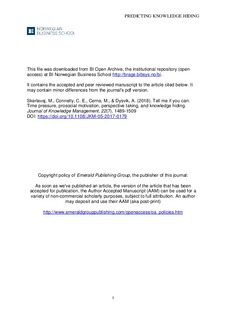Tell Me If You Can: Time Pressure, Prosocial Motivation, Perspective Taking, and Knowledge Hiding
Journal article, Peer reviewed
Published version

View/
Date
2018Metadata
Show full item recordCollections
- Publikasjoner fra CRIStin - BI [1015]
- Scientific articles [2181]
Abstract
Purpose
The belief that knowledge actually expands when it is shared has been deeply rooted in the mainstream knowledge management literature. Although many organizations and managers expect employees to share their knowledge with their colleagues, this does not always occur. This study aims to use the conservation of resources theory to explain why employees who experience greater time pressure are more likely to engage in knowledge hiding; it further considers how this behavior may be moderated by these employees’ prosocial motivation and perspective taking.
Design/methodology/approach
The paper uses quantitative multi-study research design as a combination of two-wave field study among 313 employees at an insurance company and a lab experimental study.
Findings
In the field study (Study 1), the authors find that perceived time pressure is positively related to knowledge hiding. Furthermore, this relationship is moderated by prosocial motivation: employees who perceive greater time pressure hide knowledge only when they are low in prosocial motivation. An experiment (Study 2) replicates these findings, and finds that perspective taking mediates the moderating effect of prosocial motivation on the relationship between time pressure and knowledge hiding.
Research limitations/implications
Despite its many contributions, the present research is also not without limitations. Study 1 was a cross-lagged sectional field study with self-reported data (although the two-wave design does help alleviate common-method-bias concerns). Causality concerns were further alleviated by using additional experimental study.
Practical implications
The paper highlights important reasons why people hide knowledge at work (because of experienced time pressure) as well as identifies two interlinked potential remedies (prosocial motivation and perspective taking) to reduce knowledge hiding.
Originality/value
This paper contributes to expanding nomological network of knowledge hiding construct by extending the set of known antecedents and contingencies.